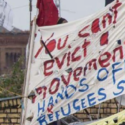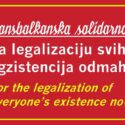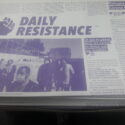Tag: covid-19
-
Waiting sentence
Uncertainty is an emotion that amplifies during a pandemic. This is a written text on my experience with the asylum process in Germany. Living in exile and reminiscent of memories. A deteriorating sense of self that the waiting game produces. I have been in my asylum process for 24 months, that is still ongoing. I…
-
Pop-Up-Impfung gegen COVID-19 auf dem Hermannplatz, Berlin, Freitag, 16.07.2021, 10-17 Uhr
Die kostenlose Impfung ist für alle Erwachsenen möglich, auch für Menschen ohne Anmeldung in Berlin und ohne Krankenversicherungsnachweis. Es sind auch Bewohner*innen anderer Bezirke eingeladen zur Impfung. Die erste Impfung findet an diesem Freitag statt: Wann: Freitag, 16.07.2021 Wo: auf dem Hermannplatz, Neukölln Uhrzeit: 10.00 – 17.00 Uhr https://fb.me/e/2S1GXCv7f Interkulturelles Aufklärungsteam Neukölln (IKAT) wird vor Ort sein…
-

Network Conference: Solidarity Struggle During Corona Virus Time
On the 19-6 at 4pm in Mehringhöfe (Gneisenaustr 2a, 10961 Berlin) Blacks and whites together for human rights will conduct the conference about how was the struggle (each group’s struggle) during the Corona Virus and what was different in this time, how can we exchange the ideas to strengthen one another in our struggle on…
-
Legalisierung Jetzt! Protest-Demo zum Roten Rathaus
Legalisierung Jetzt! Protest-Demo zum Roten Rathaus, Samstag 24. April um 14 Uhr, Alexanderplatz Berlin
-

COVID-19: No one is safe until All are protected!
Open Letter from the Transbalkan Solidarity Group Currently there are tens of thousands of refugees and other migrants in the Balkans. Some of them are accommodated in official collective centers, while a large number of people fall outside the system, surviving through the help of the local population and support provided to them by volunteers…
-

DR #7 published!
Update (10 August): The issue has been delivered and can now be picked up in Café Karanfil! You can also download and read a digital PDF version here: The issue consists of stories, statements and testimonies of people in isolated European lagers during Corona times. Languages of the texts this time: Turkish, Arabic, Urdu, Italian,…
-
DEMO – Abolish all camps!
DEUTSCH UNTEN ++ FRANÇAIS CI-DESSOUS 13:30 Start of the bicycle demos15:00 Start of the rallies with two locations We are people with and without a history of migration in Brandenburg.We fight together against racism and deadly borders. On June 1, 2020 we will meet in Potsdam to say out loud: Abolish ALL camps:Apartments instead of…